
|
|
|---|---|
|
Would you like to pay a tribute to Charlie
Send
us your stories and memories.
And photographs, if you have any. Horseytalk.net Special Interview
St. Jacobs' biggest attraction is their big country market, where vendors sell tasty pies and jams, as well as quality meats and cheeses and other fine foods. The market is located adjacent to Ontario's largest farm animals auction, the Ontario Livestock Exchange, or OLEX. Every week on Tuesdays and Thursdays, hundreds of dairy cows, beef cattle and veal calves are sold through the OLEX auction. Horses are also sold every Tuesday at OLEX. Some people are aware that horses are auctioned there, and have heard that they can be picked up for a good price. What most people are not aware of, is that nearly all the horses that are brought to OLEX are bought by horse dealers, or kill buyers, who purchase them for slaughter.
This is where Charlie's story almost ended on Tuesday, August 12th. On that day, a local woman named Karen had an appointment cancel, leaving her with the rest of the day somewhat open. She decided on a whim to drop in at the OLEX auction, not far from her home. She'd heard the reports that people come away from the auction, upset with what they see there.
Karen knew that in the ring, the horses go through quickly, and sadly, they are sold by the pound. These horses are nameless now - their luck has run out. The kill buyers take their turns buying up the horses, to fill their quotas for the slaughterhouses in Quebec and Saskatchewan. They are pushed quickly from one pen to another, then get penned up in tight quarters with many other horses that they will travel with for their last journey together. The horses are scared and resist their claustrophobic surroundings. As they jostle for space, they often bite and kick at each other, trying to avoid and escape their inevitable outcome. The auction was underway when she arrived. She squeezed her way onto the crowded bleachers of the auction ring. She watched as the horses were ushered in and encouraged to move around in the small ring in front of the auctioneer. The volume of the auctioneer's microphone was very loud. She thought, if the unfamiliar and intimidating environment didn't spook or frighten horses, the booming commentary certainly would. It was difficult to understand the auctioneer and hard to determine who was bidding and who got the high bid on the horses. She was thinking of leaving, but stopped when they led in the next horse.
Karen thought, who would bring this pony to such a place? An auction is frightening and chaotic enough for any horse, but a blind one? What chance would this pony have? Sadly she knew, he would be sold for meat, but then what? A long, arduous journey on a crowded truck to the slaughterhouse hundreds of miles away - in darkness, not knowing where he was or what was happening. She watched as a few Standardbreds went through the ring, but it didn't really register much, as she could only think of the sad chestnut pony. She left the auction area and went out to the catwalks that overlook where the cattle and horses are penned. She spotted the pony and kept an eye on him. He was standing alone and still in a corner of a long narrow pen. Before long they opened the gate and put another pony in
the pen. The new pony was very aggressive and immediately
went after the blind one. He jumped up on the helpless pony's
back and began biting him hard on the neck. Karen watched
helplessly as the blind pony didn't know what to do or where
to run. Feeling sad and powerless for what fate awaited these horses, she left feeling dejected. She worried especially about the blind pony and what would happen when it came time for him to load onto the horse dealer's truck and his probable last ride to the slaughterhouse. Karen could not erase the image of the frightened pony standing alone and blind there and knew she had try to save him. She made a call to her friend Elsa Harper at Second Chance Farm in nearby Wellesley, and soon a plan was made to save the pony.
After some investigation, Karen contacted the dealer that evening and asked to buy the pony. He reluctantly agreed, but made the deal for $50 over invoice. He had paid $21. So a deal was made, and Karen realized this little guy deserved a name, so he became "Charlie". Preparations were made. That Friday morning, on August 15th, Karen and her friend Peter made their way to Dundalk by truck and trailer, to bring home little Charlie. It was a long wait between Tuesday and Friday, hoping and praying that Charlie would still be there, and that the dealer would not back out of the deal. She found out more about him, and to her dismay, she was told that Charlie had been at the auction for a whole week! Whoever brought him was too late for the previous Tuesday's auction. For reasons only that person can explain, and will live with for the rest of their life, Charlie was left to whatever demise would befall him. For a whole week, in his blind, confused state, he stood alone and abandoned in that scary place.
Rather than make small talk with the kill buyer, they quickly loaded Charlie up into the trailer, and with a great sigh of relief were on their way! After a couple of hours driving to Wellesley, many people were there at Second Chance Farm waiting anxiously for Charlie's arrival. What Elsa and the others saw, when the trailer was opened, was a beautiful chestnut gelding pony, with a flaxen mane and tail, and a bright white blaze on his concerned face. He was led out, walking slowly and carefully down the ramp. He had no choice - he had to trust the hands that led him and the voices that reassured him, "It's alright Charlie, you're home and safe now." He held his head up high, taking in the sounds around him, perhaps seeing shadows of his new surroundings.
With those experiences behind him now, Charlie walked carefully away from the trailer with high deliberate steps - the way blind horses will walk when they are unfamiliar with their surroundings. His fate was now in the hands of people who he would have to learn to trust. But Charlie is a trusting pony. Anyone who knows horses know that they are trusting by nature. If their spirit has not been broken by cruel handling, even sightless horses like Charlie who have been through so much, want to trust the humans who tend to them. So sadly, even horses that go to slaughter look for compassion and refuge from the humans who ultimately put them to their death. To protect the other horses from possible infectious disease, Charlie has been quarantined since his arrival. He does get lots of sunshine, fresh air and some grass, as the children at Second Chance Farm all want to take their turns tending to him. He's been vet checked, and was on a 5-day deworming schedule, as tests proved he was very wormy. His blood work shows him to be slightly anemic. The plan is to augment his diet with a supplement to improve his red blood cells. There is no evidence of previous founder, but his diet will be monitored to help minimize the risk of founder. He will be kept off rich pasture. The vet estimates his age to be about 15 year old.
When the CHDC found out about Charlie, we knew we had to help. This blind pony's story exemplifies the plight of the thousands of horses that die in Canadian slaughterhouses every week. The horses are not all blind, but their fate is just as helpless as little Charlie's was. So many are beautiful young horses whose luck ran out the day they were purchased by a kill buyer at an auction. In 2008, it is estimated that over 100,000 horses' lives will end in Canada to satisfy consumers of horsemeat in Europe and Asia. These horses will die due to a foreign consumer market - not because these horses are unwanted. There are many examples of kill buyers outbidding people at auctions who want to give a horse a new home - a new chance at life. If you find it in your heart, please help horses like Charlie who will never be a riding pony again, but can be a pasture mate. Help the beautiful young horses that never got the training they needed, but just need patience and time to become a faithful riding horse. When your old or sick horses cannot be looked after any longer due to poor health, call your vet and have your horse humanely euthanized. Sending your horse to slaughter is not humane. You need only to read the CHDC June 2008 report on Natural Valley Farms to understand the horrors of horse slaughter.
And if you haven't done so already, take a look at Charlie's video. There are so many horses with stories like Charlie's. Please do your part to support our horse rescues. To find a list of Canadian horse rescues, please visit the CHDC website. If you run a horse rescue or would like to become involved with helping save horses from slaughter, the CHDC would like to hear from you. Thank you for caring to read about Charlie. He is just one of so many horses that deserve a safe and happy life. Shelley Grainger | |






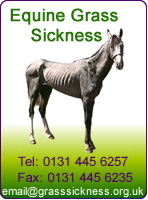

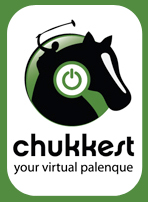




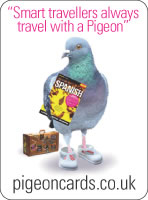





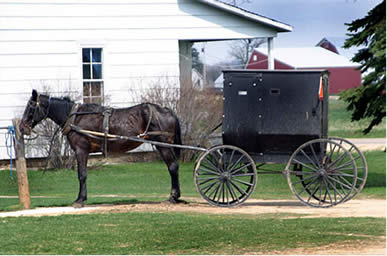 In
the south central region of Ontario lies the quaint village
of St. Jacobs. It's best known as a tourist town, with people
visiting from all parts of the region to wander the town's
streets and shop at its country stores and markets. Mennonites
and Amish live there, and are frequently seen dressed in
their traditional garb, riding in their black buggies, pulled
by faithful, hard working horses.
In
the south central region of Ontario lies the quaint village
of St. Jacobs. It's best known as a tourist town, with people
visiting from all parts of the region to wander the town's
streets and shop at its country stores and markets. Mennonites
and Amish live there, and are frequently seen dressed in
their traditional garb, riding in their black buggies, pulled
by faithful, hard working horses. 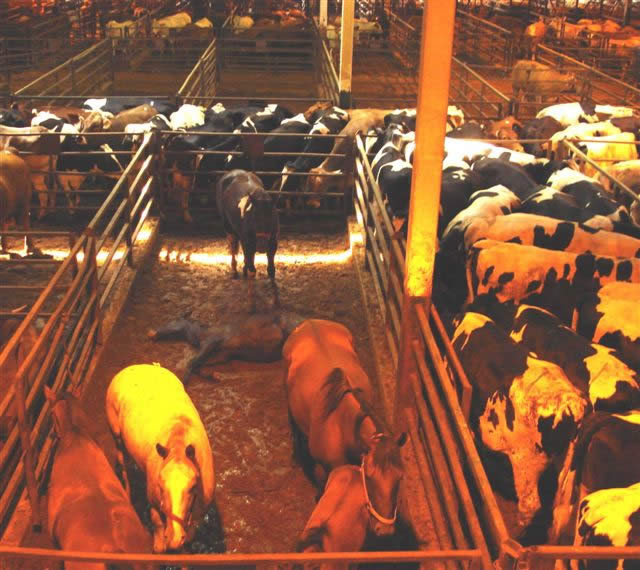
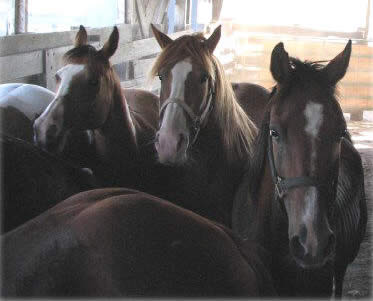 When she arrived, she observed the usual busy atmosphere,
of moaning cattle and neighing of frightened horses, amongst
the men who work there, who see the animals as just another
number on just another day. These men, most of them Mennonites,
are not seen to have a lot of compassion for the many animals
that move through the auction. To them it is a job and the
animals simply a product of that industry.
When she arrived, she observed the usual busy atmosphere,
of moaning cattle and neighing of frightened horses, amongst
the men who work there, who see the animals as just another
number on just another day. These men, most of them Mennonites,
are not seen to have a lot of compassion for the many animals
that move through the auction. To them it is a job and the
animals simply a product of that industry. 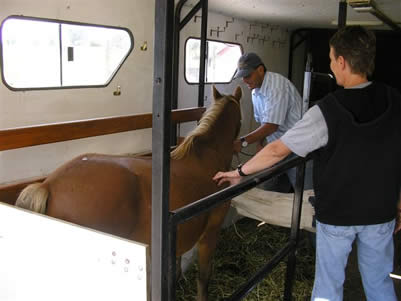 Most horses run quickly into the ring, prodded in with whips
or shouts, and walk or prance around the small area, persuaded
by the handler. But this time the door opened and a small
chestnut pony was slowly handed over by his halter to the
ring man. A hush settled amongst the crowd before whispers
were exchanged. The auctioneer then bellowed "blind
pony (ha!) a short-sighted pony here, short-sighted pony".
Most horses run quickly into the ring, prodded in with whips
or shouts, and walk or prance around the small area, persuaded
by the handler. But this time the door opened and a small
chestnut pony was slowly handed over by his halter to the
ring man. A hush settled amongst the crowd before whispers
were exchanged. The auctioneer then bellowed "blind
pony (ha!) a short-sighted pony here, short-sighted pony". 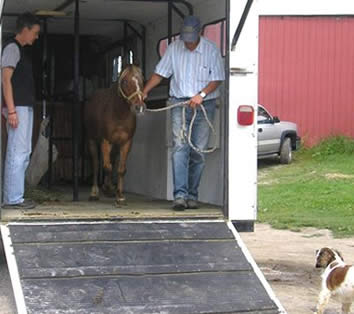 After several phone calls between Elsa, Karen and Shelley
Grainger from the Canadian Horse Defense Coalition (CHDC),
it was agreed that they would try to save this pony, so Elsa
and Karen returned to OLEX. To their dismay, the pony was
gone. They managed to determine that he had been purchased
by a local horse dealer. After speaking with another dealer,
they became alarmed since it was confirmed that the man was
a kill buyer, and that the pony would very likely be going
to slaughter soon.
After several phone calls between Elsa, Karen and Shelley
Grainger from the Canadian Horse Defense Coalition (CHDC),
it was agreed that they would try to save this pony, so Elsa
and Karen returned to OLEX. To their dismay, the pony was
gone. They managed to determine that he had been purchased
by a local horse dealer. After speaking with another dealer,
they became alarmed since it was confirmed that the man was
a kill buyer, and that the pony would very likely be going
to slaughter soon. 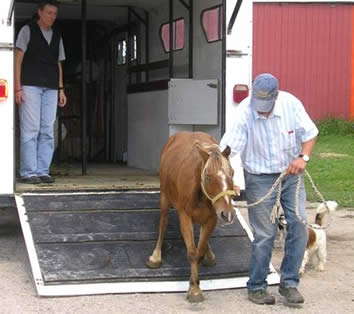 When they arrived at the farm to pick up Charlie, they saw
many horses that the horse dealer had picked up. They were
told the horses typically spend two days holdover at the
farm, then they are loaded onto a truck for the long, arduous
journey to Saskatchewan, to Natural Valley Farms horse slaughter
plant. Only a lucky few would not go to slaughter - the ones
he determined he could resell for good money, but most -
their fate was sealed.
When they arrived at the farm to pick up Charlie, they saw
many horses that the horse dealer had picked up. They were
told the horses typically spend two days holdover at the
farm, then they are loaded onto a truck for the long, arduous
journey to Saskatchewan, to Natural Valley Farms horse slaughter
plant. Only a lucky few would not go to slaughter - the ones
he determined he could resell for good money, but most -
their fate was sealed. 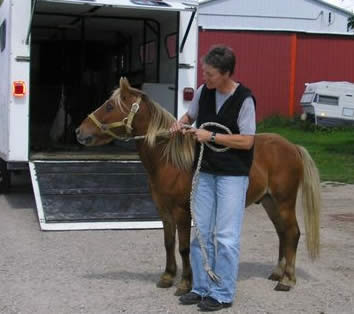 It wasn't long before they realized that Charlie was once
probably a well looked after pony - perhaps a child's beloved
mount. His coat was good, and his feet strong and just a
little long, but the look on his face was one of fear. How
could he not be in fear? Charlie is totally blind. One eye
is deformed and calcified - the other a white milky colour.
For over a week now, everything and everyone was strange
to him. He'd been driven from his home to a large, noisy,
cavernous auction, with nothing but rough hands and voices,
and strange sounds surrounding him. For days that was his
world - a prison of sorts.
It wasn't long before they realized that Charlie was once
probably a well looked after pony - perhaps a child's beloved
mount. His coat was good, and his feet strong and just a
little long, but the look on his face was one of fear. How
could he not be in fear? Charlie is totally blind. One eye
is deformed and calcified - the other a white milky colour.
For over a week now, everything and everyone was strange
to him. He'd been driven from his home to a large, noisy,
cavernous auction, with nothing but rough hands and voices,
and strange sounds surrounding him. For days that was his
world - a prison of sorts. 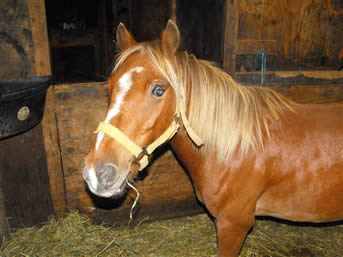 His eyesight is virtually gone, but his appearance is otherwise
good. He's been a tough little guy, holding up very well
under the circumstances. After his deworming he'll be vaccinated,
his feet will be trimmed and his teeth checked.
His eyesight is virtually gone, but his appearance is otherwise
good. He's been a tough little guy, holding up very well
under the circumstances. After his deworming he'll be vaccinated,
his feet will be trimmed and his teeth checked. 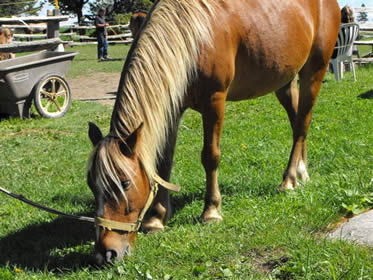 If you would like to contribute towards Charlie's care,
please contact the CHDC here or Second Chance Farm here.
If you would like to contribute towards Charlie's care,
please contact the CHDC here or Second Chance Farm here.